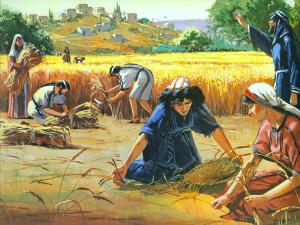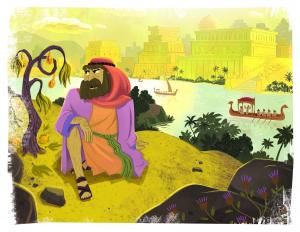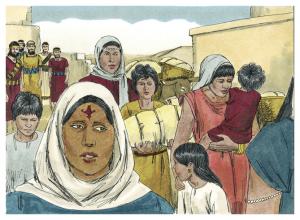
In the Book of Ruth a member of a nation that Israel traded and warred with off and on becomes one of the Israelite people and an ancestor of Israel’s most loved king, King David. Jesus career is like Ruth’s.
Episode 10 in Opening the Scriptures on the Way to Emmaus: Why Messiah had to Suffer. Introduction and links to other posts in the series here.
Ruth’s story begins.
Naomi is an Israelite woman living in the land of Moab at a time before there were kings in Israel. Her two sons have married two Moabite women, but both sons and Naomi’s husband have died. As Naomi starts her journey back to Israel and an uncertain future, she tells her daughters-in-law to stay behind and marry again to Moabite men. Ruth won’t leave Naomi, insisting,
Wherever you go I will go. Wherever you lodge I will lodge. Your people shall be my people, and your God my God. Wherever you die I will die, and there be buried. May the Lord do so and so to me, and more besides, if aught but death separates me from you!” (Ruth 1:16-17)
To us it sounds like a moving story of a daughter-in-law’s devotion. At the time it was written I imagine what many people saw first in Ruth is that she is a foreigner.
Ruth ekes out a living for herself and Naomi by following up the harvesters in a field belonging to Boaz, gleaning what they left behind. Israelite law required harvesters to leave something behind for the poorest people. She eventually marries Boaz. King David is her great grandson.
Ruth and Jesus
The story includes three details worth noting.
First detail: Ruth is subject to the typical prejudice against foreigners. She deals with it by gleaning only in fields belonging to Boaz, a relative of Naomi.
Second detail: Ruth engages in behavior that, at least by the time the story was written, was considered questionable. On the advice of Naomi she gets cleaned and dressed up and finds Boaz asleep on the threshing floor after he’s taken on some wine in honor of a hard day’s work. The Bible says she “uncovered a place at his feet and lay down.” Commentators inform us that “feet” could be a euphemism for a man’s genitals. The action was risqué enough, in any case, that some later versions of the story make Naomi the one who lay at Boaz’s “feet,” preferring incest to having any suspicion clinging to David’s blood line.
The third detail is an experience of rejection, a happy one as it turns out. Boaz can’t automatically marry Ruth because a closer relative to Naomi has, legally, a prior claim. Boaz informs the man that Naomi is selling a piece of property, and the man is eager to buy it. But when informed that Ruth comes along with the property, he backs out, probably thinking he doesn’t want to share his estate with any children he might sire by her.
A protest against a theology of exclusion
The Encyclopedia Judaica says the Book of Ruth is a “subtle but forceful protest against the Ezra-Nehemiah attitude toward foreign women.” It’s easy enough to see Jesus in the figure of Ruth. She’s a stranger who freely goes to a place where she will be the lowest in society. She scandalizes. She is rejected (before being vindicated). This story challenges the common thinking of the Jews after the Exile in the same way Jesus challenges his time and ours.
In Jesus’ words, “The Son of Man has nowhere to rest his head.” That was a choice very much like Ruth’s. I can imagine Jesus saying to the two on the way to Emmaus, repeating Ruth: “Wherever you lodge I shall lodge.” Jesus says the same to us, especially to the most rejected, from his place on the cross.
Image credit: WordPress.com via Google Images












